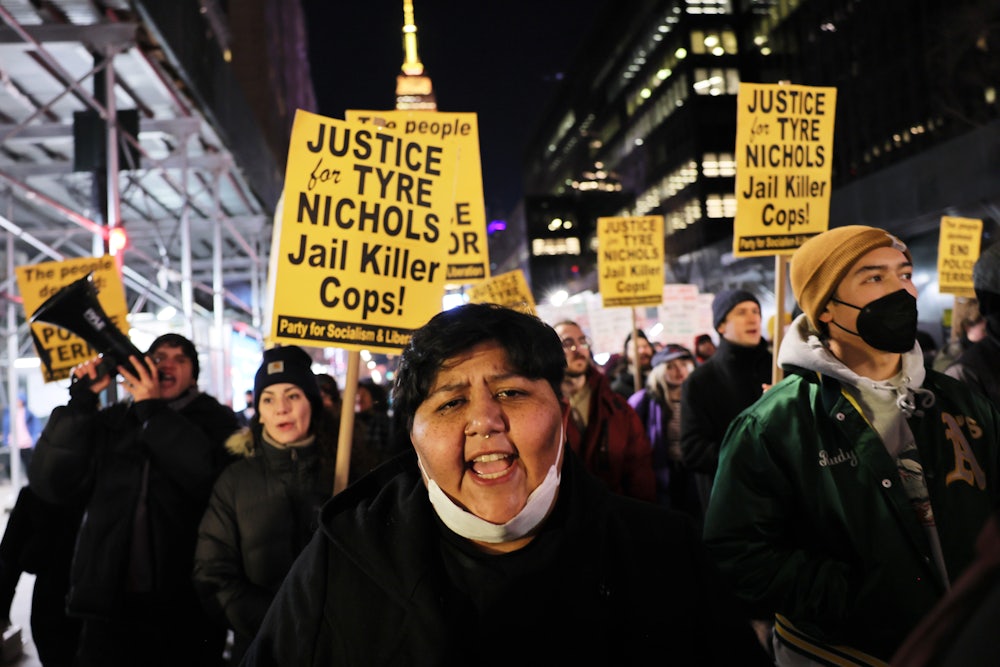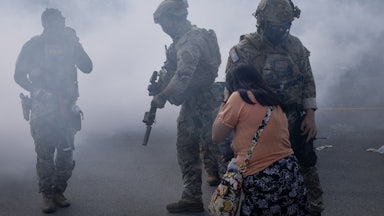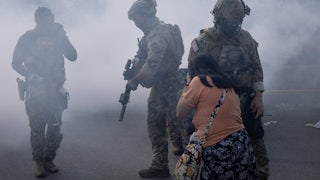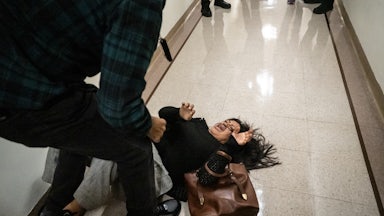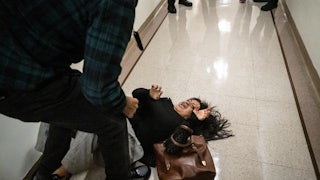Every bit as disturbing as the savagery displayed by the Memphis police officers who beat Tyre Nichols within an inch of his life was the utter nonchalance they displayed as they went about it. In the fourth video, the one from the mounted police cam, four or five officers engage in kicking, punching, and beating Nichols for four or five minutes. He lies on the street corner, seemingly near lifelessness (he died three days later in the hospital). But after the violence ends, the police officers just … stand around. No one is in a panic. No one is calling EMS. No one is even trying to look at Nichols to see if he’s breathing, if he can speak. It’s the definition of depraved indifference to human life. No one with even an average conscience can watch it without wondering: What happened to these men to make them like this? What is it about the culture they inhabit that turned them into such monsters?
We are taught that cops aren’t like this. In the movies and TV, it’s a signal to audiences that the cop is decent and honest if he shoots an assailant and immediately radios for medical help. I don’t doubt that there are many cops who do this. They don’t want a death on their conscience—about three-quarters of cops report never pulling their service revolvers even once in their careers—an indication that violent incidents can be unexpected and traumatic for them too. They don’t want Internal Affairs in their business for the next two years of their lives. There’s no statistic for the number of times level-headed cops de-escalated potentially violent situations, so we’ll never know how often that happens, but it does.
Still, what happened in Memphis happened, and such incidents happen with steady frequency, far too often. Why? It’s not enough to say simplistically that cops are sadists. They, like everyone, are products of a system, and our American system of policing is terrible and makes violence more likely. Here are three changes we could make: one, fewer independent police forces and more statewide—or yes, even federal—standards for police forces; two, far fewer traffic stops to begin with; three, traffic stops made, when they are deemed necessary, by unarmed peace officers, not armed cops.
There are about 18,000 different police forces in the United States, a far greater number than in any other OECD country. On the one extreme you have Sweden, with one national police force. Closer to the American model is England, which has different regional police forces. But those regional forces have to comply with certain national standards. We don’t have anything remotely like that here, and pushing for anything along those lines would be a nearly impossible political lift.
What we have had is a fairly impressive number of state laws, about 140, passed since George Floyd’s murder that seek in some way to rein in police officers: limiting their immunity from prosecution, mandating body cams, limiting certain kinds of warrants. Of course, this action has almost all taken place in a handful of blue states, excepting Kentucky, which has acted in response to the heinous killing of Breonna Taylor.
I understand that the U.S. is never going to be Sweden or England. We’re a more violent society; there are 400 million guns floating around—a calculation that the police officers of other countries don’t have to price in every time they walk their beat. But more federal laws and standards would help around the margins. I understand that this is a near impossibility politically, but it’s still useful to think in these terms and put the question on the table: Why is policing considered a purely local matter in the U.S., especially when we see these tragedies repeat themselves in Minneapolis and Louisville and Dallas and Memphis and so many other places? And when we see that other democracies treat policing as more of a national or at least regional matter?
Number two: In this age of cameras and powerful computers, there’s very little need for most traffic stops at all. If someone’s doing 62 near an elementary school, or zigging and zagging out of control across the yellow line, then yes, obviously, pull them over. But otherwise, why can’t a photo do the job? Expired registration, nonworking headlamp? Take a photo, run the plate, send the person a notice in the mail.
It’s easy. It’s done in some places. In 2020, the state of Virginia passed some bills limiting pretextual traffic stops—for example, when police spot nonfunctioning brake or tail lights or hear an overly loud exhaust system. In Minneapolis, they hand out free repair vouchers instead of issuing summonses for things like broken tail lights. A promising experiment was conducted in Fayetteville, North Carolina, from 2013 to 2016, when the police chief banned pretextual stops, and vehicle searches of Black drivers went down (and speeding tickets went up and traffic fatalities went down, against the predictions of some experts).
But we know all too well why most places refuse to do this. Cops hassle drivers because they’re pressured to produce municipal revenue. This has been a topic of a recent flap in Memphis, where Nichols was murdered. After the pandemic hit, Memphis decided to cut back on traffic stops. Revenue dropped from $12 million to around $7.5 million. This became a controversy, apparently stirred up by the local Fox affiliate, which denounced the “radical” change. So stops picked up again, and a 2021 study found—you guessed it—that Blacks bore the brunt of it. A sample of 487 criminal court cases that started with traffic stops found that 90 percent of those stopped were Black (64 percent of Memphians are Black).
This revenue pressure is what has to stop. This isn’t just, or even mainly, a big-city thing. The New York Times found in late 2021 that 730 municipalities rely on traffic fines for at least 10 percent of their operating revenue. These towns and cities were concentrated, unshockingly, in the South because Republican governors and state legislators keep cutting taxes to the bone, leaving cities and towns in a scramble to make ends meet.
Congress bears the blame too. Republican demands in the current/upcoming debt ceiling battle are for deep budget cuts. (At least, that’s what we assume the demands will be—Republicans haven’t really said because they know very well that what they’re seeking is overwhelmingly unpopular, except with their rich donors.) That means, for the most part, cuts to what wonks call the nondefense discretionary budget—domestic spending, in other words—which accounts for about $750 billion of the roughly $6 trillion federal budget. State and local aid, and programs for poor people, always take the hit.
George Floyd and Breonna Taylor weren’t behind the wheel of an automobile. But Tyre Nichols was, as were most of the other recent victims of racial police violence. The most hideous case, to me, was that of Sandra Bland in Dallas, who was pulled over for not using her turn indicator to change lanes. These encounters were all completely unnecessary—or they would be, in a universe where we had better priorities and didn’t starve local governments.
But even when such traffic stops are necessary, they should be made by unarmed peace officers. Certain localities are trying this; it’s too new and limited to draw many firm conclusions. I know some will say this would leave these unarmed officers exposed. Maybe. But really, think about it. How many people are crazy enough to shoot an officer they know to be unarmed? People shoot cops when they see the cop has a gun and draws it and they think they’re going to die. Very, very, very few people are sociopathic enough to shoot an unarmed officer for kicks, if only because they know it will almost surely cost them their freedom for the rest of their lives.
So: Rethink how policing is structured in this country. Vastly reduce the number of traffic stops made by cops; let cameras carry the burden. And, if and when stops must be made, give unarmed officers the job.
These aren’t perfect solutions; there isn’t such a thing. In some places where these ideas have been tried, traffic and pedestrian fatalities ticked up. There are a lot of wanton drivers out there. But a ticket to a reckless speeder can as easily be dispensed by an unarmed cop as an armed one, or even by a camera, which creates a situation that is very unlikely to escalate into violence.
I know this much: Police officers killed 600 motorists from 2017 through early 2022. That’s two a week. How much of this carnage, the vast majority of it directed at Black people “guilty” of things like hanging something from their rearview mirror, are we going to endure? We’re probably not going to be able make much progress in trying to reduce the savagery of people like the men who killed Nichols. That’s all too baked into American police culture, alas. What we can do, though, is give depraved cops fewer chances to express their violent tendencies.
